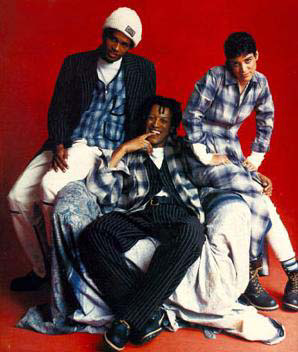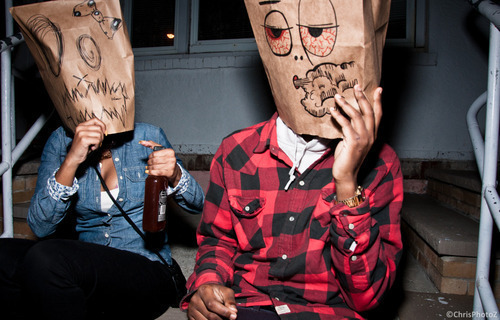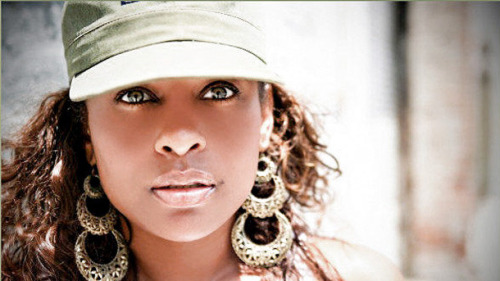-Friedrich Nietzsche"Our treasure lies in the beehive of our knowledge. We are perpetually on the way thither, being by nature winged insects and honey gatherers of the mind."
THE DIGABLE PLANETS
 The Digable Planets are a hip-hop trio
whose two years of fame made them hip-hop hall-of-famers. The three’s popularity skyrocketed with
the release of their first album, On
Reachin’ (A New Refutation of Time and Space), in 1993. Ishmael “Butterfly” Buttler, Mary Ann “Ladbug Mecca” Vieira, and
Craig “Doodlebug” Irving are the
three insects that make up the group.
They met in New York City, NY and re-invented what hip-hop was to DJs,
emcees, and listeners alike. Their smooth jazz and cool hip-hop fusion redefined
the genre. The name of the band sprang from the idea that each person is a
unique and entire planet. The
band’s homage to insects is based on the observation that insects, unlike
humans in many cases, are adept at working together.
The Digable Planets are a hip-hop trio
whose two years of fame made them hip-hop hall-of-famers. The three’s popularity skyrocketed with
the release of their first album, On
Reachin’ (A New Refutation of Time and Space), in 1993. Ishmael “Butterfly” Buttler, Mary Ann “Ladbug Mecca” Vieira, and
Craig “Doodlebug” Irving are the
three insects that make up the group.
They met in New York City, NY and re-invented what hip-hop was to DJs,
emcees, and listeners alike. Their smooth jazz and cool hip-hop fusion redefined
the genre. The name of the band sprang from the idea that each person is a
unique and entire planet. The
band’s homage to insects is based on the observation that insects, unlike
humans in many cases, are adept at working together.
The Path to Success
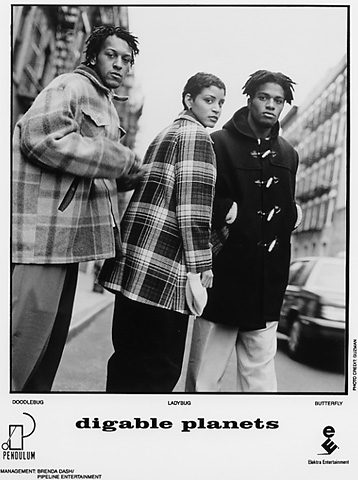 Like most musicians, The Digable Planets did not start their
careers so successfully. The trio met in New York City, and the three were
immediate friends. They lived together initially in New Jersey, and later they moved
to NYC. Their move to NY put them in the Brooklyn ghetto, where they struggled
to get the band on its feet. Ladybug was selling shoes until the band received
its first record deal in 1992.
Following the release of the album, the group first appeared on Music
Television (MTV). Seeing their new and hip style a new audience of listeners from
across the globe tuned in to listen the insect's flow. The group created a new spin on the nappy-headed, flannel-wearing image that many of the West Coast rappers had by projecting a cool, laid-back attitude. This new, hip style instantly became
extremely popular and had now literally spread from coast to coast.
Like most musicians, The Digable Planets did not start their
careers so successfully. The trio met in New York City, and the three were
immediate friends. They lived together initially in New Jersey, and later they moved
to NYC. Their move to NY put them in the Brooklyn ghetto, where they struggled
to get the band on its feet. Ladybug was selling shoes until the band received
its first record deal in 1992.
Following the release of the album, the group first appeared on Music
Television (MTV). Seeing their new and hip style a new audience of listeners from
across the globe tuned in to listen the insect's flow. The group created a new spin on the nappy-headed, flannel-wearing image that many of the West Coast rappers had by projecting a cool, laid-back attitude. This new, hip style instantly became
extremely popular and had now literally spread from coast to coast.
Reachin’
(A New Refutation of Time and Space) synthesized elements of funk, jazz,
psychedelia, and samba. The album was produced by Butterfly and released by
Pendulum/Elektra Records. All three insects throw down their rhymes over funky and fat tracks consisting of saxophones, trumpets, stand up bass, and other groovy instruments. The lyrics of the songs varies greatly. Each of the trio has a specific style of hip-hop. Like other hip-hop groups (TCQ and Wu Tange), each voice in The Digable Planets is unique and the mixture of the three creates one incredible and head bobbing sound.
Samples of Kool & Gang and Herbie Hancock were used
extensively, adding a touch of funk. With the release of their hit single, “Rebirth of
Slick (Cool Like Dat),” The Digable Planets took off. They won a Grammy Award for that song! and as of about 3 or 4 years ago, the song appeared in a Tide
commercial (see below).
I know, Tide commercials aren't all that cool... But the Digable Planets are, so I am down. The trio’s second album, Blowout Comb,
was released 1994. It was not nearly as well recieved as their first, but in my oppinion it is just as good and has some major jams like 'The May 4th Movement Starting Doodlebug.' The whole album consists of amazing samples and dope flows with shout outs and tracks from funk, jazz, and hip-stars like James Brown, Grandmaster Flash & The Furious Five, and, believe it or not, they use a drum beat from a late sixties Bill Cosby song titled Get Out of my Life, Woman.
Butterfly
Doodlebug (AKA Cee Knowledge)
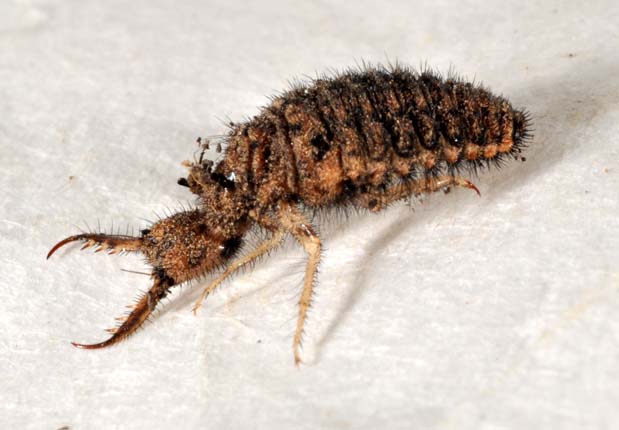 Craig “Doodlebug” Irving was born in Philadelphia in
the late 1960s. Jazz was a
formative part of his childhood, as it was with Butterfly. In an interview with Ann Powers of
Spin, he said, “My mother would always sit around, reading a book or the Sunday
paper, and listen to jazz. My aunt
taught me about Bessie Smith and Billie Holiday; she was always playing the
records and talking about them.”
From Philadelphia he moved to Washington, D.C., where he attended Howard
University. At the university, he
made a name for himself as a DJ.
He also was affiliated with members of the Five Percent Nation of Islam
and adopted some of the group’s ideology of black power. When the band met in New York, he was a
member of the Dread Poets Society.
He has said that his biggest struggle has been balancing his life as a
touring musician with his life as a father. When asked to define his musical style in three words, he
answered “jazz, jive, and poetry.”
Craig “Doodlebug” Irving was born in Philadelphia in
the late 1960s. Jazz was a
formative part of his childhood, as it was with Butterfly. In an interview with Ann Powers of
Spin, he said, “My mother would always sit around, reading a book or the Sunday
paper, and listen to jazz. My aunt
taught me about Bessie Smith and Billie Holiday; she was always playing the
records and talking about them.”
From Philadelphia he moved to Washington, D.C., where he attended Howard
University. At the university, he
made a name for himself as a DJ.
He also was affiliated with members of the Five Percent Nation of Islam
and adopted some of the group’s ideology of black power. When the band met in New York, he was a
member of the Dread Poets Society.
He has said that his biggest struggle has been balancing his life as a
touring musician with his life as a father. When asked to define his musical style in three words, he
answered “jazz, jive, and poetry.”
Ladybug Mecca (AKA
LadyBUGMEK AKA Tracy Triceratops)
Mary Ann “Ladybug Mecca” Vieira was
born in Brazil in the mid-1970s but spent most of her childhood in Maryland.
Like many other high-schoolers, Ladybug couldn’t wait to get out of high school.
She hated it, and switched schools four times. She used rap as a method of
escape from the stressful life of a student.
 When I am asked to list female rappers that have flow, only
a few come to mind and Ladybug is at the top of that list. I can hardly count them
one hand: 1. Ladybug Mecca, 2. Yolandi of Die Antwoord, 3. Jane Doe, 4. Iggy
Azalea (B-Rookies Iggy A Blog), and 5. It’s hard to fill the spot, but if it were up to me, I’d call it a tie
between Lauryn Hill, M.I.A., and Nicki Manaj. There is no doubt Ladybug takes the gold.
When I am asked to list female rappers that have flow, only
a few come to mind and Ladybug is at the top of that list. I can hardly count them
one hand: 1. Ladybug Mecca, 2. Yolandi of Die Antwoord, 3. Jane Doe, 4. Iggy
Azalea (B-Rookies Iggy A Blog), and 5. It’s hard to fill the spot, but if it were up to me, I’d call it a tie
between Lauryn Hill, M.I.A., and Nicki Manaj. There is no doubt Ladybug takes the gold.
HERE COME THE DINO 5
After her career with her fellow insects Ladybug changed her
nickname to Tracy Triceratops, one of the 5 Dino Five members. The rest of the
Dino crew consists of DJ stegosaurus (Prince Paul), MC T-Rex (Chali 2na of
Jurassic 5), Billy Brontosaurus (Wordsworth of eMC), and Teo Pterodatyl
(Scratch of The Roots). The extremely talented five mix their sound and flow
together to create an incredible sound suited for all ears. The group is
primarily directed towards children but I think any one can “Get down with the
Dino 5 song” (Tracy Triceratops). They have released an album and appeared on
Broadway and will likely hit a popular children’s television station very soon.
The Dino’s tell a story of friendship, teaches the kids their ABC’s and life
lessons while also letting them boogie down to the dope beats and fat rhymes.
The Divide
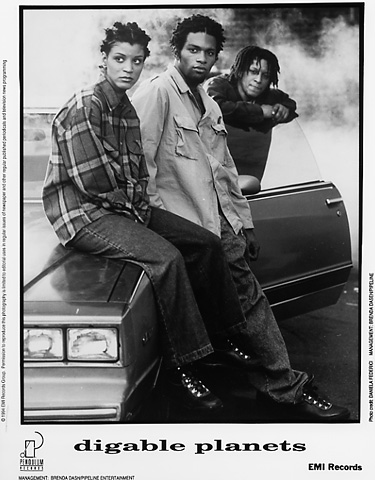 Digable Planets broke up in 1994 after
Ladybug’s parents died quickly one after the other. Different interviews’
content varies on the subject of what broke up the band in the end. Most say
artistic differences were the primary cause of the split up others say that Ladybug's loss was the cause.
Digable Planets broke up in 1994 after
Ladybug’s parents died quickly one after the other. Different interviews’
content varies on the subject of what broke up the band in the end. Most say
artistic differences were the primary cause of the split up others say that Ladybug's loss was the cause.
Reunion? Or never
again
There have been only a few reunion shows.
The band’s last record release was in ’94 when they split, but in 2005 the
group surprised their fans with a reunion tour. Butterfly, Doodle, and Ms.
Mecca played a select number of shows, a few of which were canceled. Starting
in 2006 Ladybug stopped agreeing to more and more gigs. In 2008 The Digable
Planets hit the stage again, and crowds went wild. The tour was planned to last
through ’09, and indeed it did – only something was different. Ladybug Mecca
was not present. Though Doodlebug and Butterfly could move the crowd, all
audiences noticed the absence of Ms. Mecca. Her unique flow and the addition of
estrogen made The Planets what they were. When asked about the most recent tour
in 2012, Mecca’s spokesperson responded:
"Though a dialog has started about possible plans in the
future, nothing has been contracted yet. All reports of Digable Planets, and/or
Ladybug Mecca's appearance with them, are false and inaccurate."
"Though a dialog has started about possible plans in the future, nothing
has been contracted yet. All reports of Digable Planets, and/or Ladybug Mecca's
appearance with them, are false and inaccurate."
No one is quite sure why exactly Ladybug Mecca has this beef
with Doodle and Fly. Perhaps there is none, and she is just busy with the Dino
5, collaborations with other artists, and her own career as a rapper and DJ.
Last year, she performed at LOLA in St. Louis with an amazing two-hour set. All Digable Planets fans, like myself, are hopeful
for another reunion tour, but currently things aren’t looking too hopeful. In
the meantime, I am going to go buy some tickets for Doodlebug and Butterfly’s
next gig in the 512.

